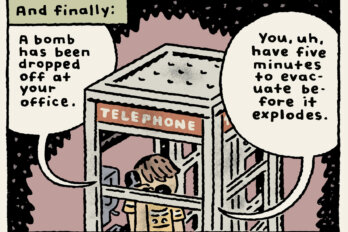Jordan Abel is a Nisga’a writer whose work pushes at what is possible in poetry. Drawing from a multitude of genres, such as ethnography, photography, historic fiction, pulp novels, Abel assembles critical poetic collages that confront the enduring legacies of colonialism. In his first book of poetry The Place of Scraps, Abel carved away at the ethnographic writings of Marius Barbeau and established his own voice—a resistant, transformative lyric skillfully forged out of settler colonial texts.
For his second and third books, Un/inhabited and Injun, Abel used ninety-one Western novels as source texts, searching for land-related language and use of the word “injun” respectively and then reconstructing these instances into visually provocative poems. These are conceptual projects that stage encounters with racism in an attempt to rework its terms.
Born in BC, Abel is currently a doctoral candidate at Simon Fraser University where he researches the intersection of Digital Humanities and Indigenous Literary Studies. He is the author of three books of poetry, including Injun, which won the 2017 Griffin Poetry Prize. I sat down with him to chat about what makes a poem compelling and what he’s looking for this year as a judge of The Walrus Poetry Prize 2017.
You’re one of the judges this year’s poetry contest for The Walrus. I’m curious about what kinds of poems captivate you? What does it take for a poem to strike you? I think that’s just it: I want to be captivated by a poem. From the first line to the last. Regardless of style or subject, I’d like to begin to read a poem and then not be able to stop. And when I get to the end, I really want to have the urge to read it again. Whatever that is. That’s the quality that I’d like the poem to have.
The last year has been a whirlwind for you with Injun winning the Griffin poetry prize. What’s it like to pivot from being an emerging writer to becoming an established writer who judges contests? To be honest, I’m still trying to figure that out. On one level, I don’t really feel that different. I still have creative projects that I’m slowly working on that I’d like to finish. I still have a PhD that I’m slowly working on that I’d like to finish. Basically, I feel like I still have a whole bunch of stuff I want to do that I haven’t accomplished yet. On another level, it’s exciting to take on new roles and to see these kinds of things from the other side. Feels like it wasn’t so long ago that I was submitting work to contests, hoping that someone would like my work. I’m looking forward to seeing what people have sent in.
Your poetry is deeply engaged in critiquing colonial ideologies and legacies. What is it about poetry as a genre that is an ideal site for these kinds of conversations? Poetry is a convenient genre to publish in because it is so accepting of works that don’t fit easily into other categories. My first book, The Place of Scraps, was published as a book of poetry. But that book was more accurately a multi-genre book. TPOS contained non-fiction, historical fiction, poetry, and photography. Likewise, both Un/inhabited and Injun were also published as poetry. But both books were built entirely out of fiction. Poetry is not really that concerned with policing boundaries. And/or it’s not really concerned with what is or isn’t poetry. I think that flexibility and openness is what makes poetry an ideal space to work in.
What excites you most about the poetry world right now? Right now I’m really into work that bridges the gap between poetry and essay. I recently re-read Claudia Rankine’s Citizen and Renee Gladman’s Calamities. Both really amazing works that very often don’t look or feel like we might expect poetry to look or feel. But that’s part of the reason why I love those books.
What issues, directions, forms do you anticipate are on the horizon for poetry? I never know what poets are going to do. Remember the year that Beatriz Hausner’s Enter the Raccoon came out? I don’t think anyone was predicting that we were going to get a poems about a love affair between a woman and a racoon. Good poetry is always a complete surprise to me.
To find out more about submitting to The Walrus Poetry Prize, click here.





